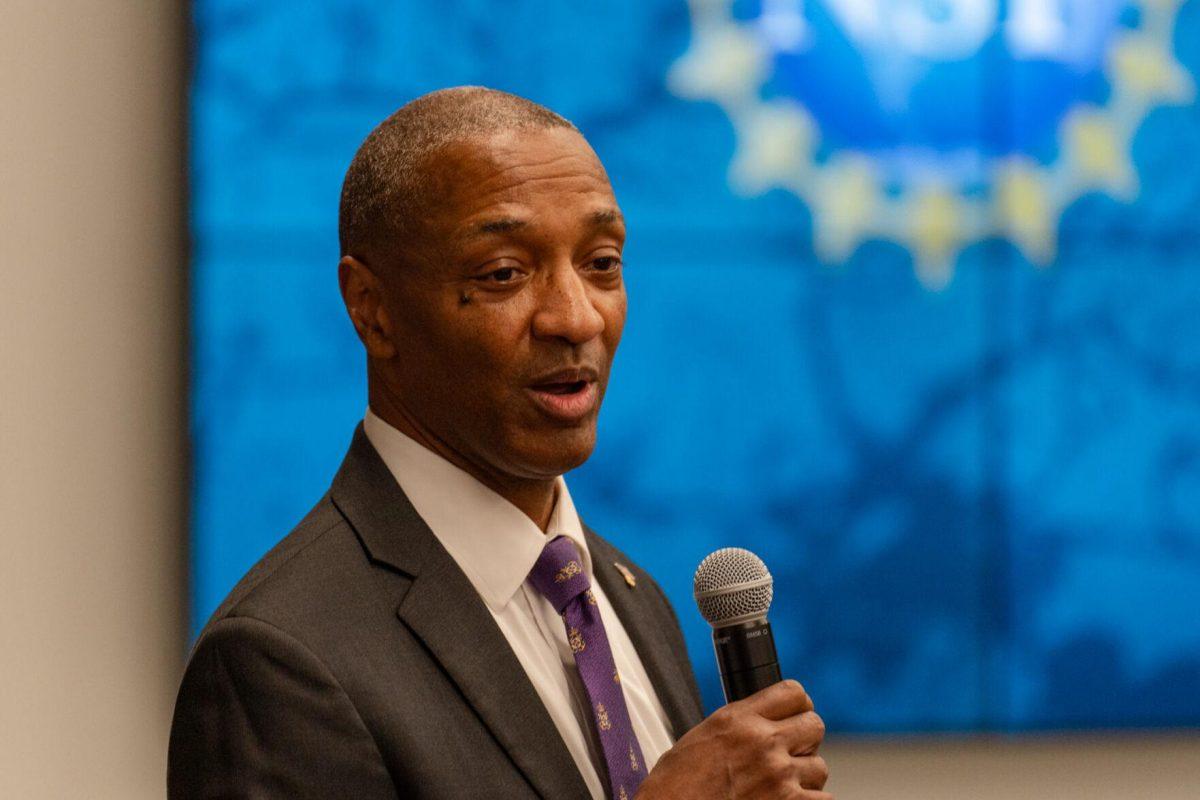Alternatives to traditional higher education that emphasize technology have caught the eye of the Transition Advisory Team and University administrators who say efficiency is the guiding principle of the LSU System reorganization.
“There’s no doubt that technology’s going to play a huge role,” said Interim System President and Chancellor William “Bill” Jenkins. “How we teach is changing, and how you’re going to go to class is changing.”
Jeff Selingo, author of “College (Un)Bound: The Future of Higher Education and What It Means for Students,” addressed the Transition Advisory Team via Skype at its Jan. 8 kickoff meeting to inform the team about alternatives like hybrid classes and online courses that are necessary for some universities struggling with decreasing state appropriations.
“Can we do things in a more productive manner, and can we do things at a lower cost?” asked Executive Vice Chancellor and Provost Stuart Bell. “Can faculty and students work together across these campuses?”
Many students don’t realize their classes are already part of the push toward an increasing hybrid education experience because the use of websites and other online aides seems like a natural progression, Bell said.
“Ten or 20 years ago, everything was done with a soft rock on a hard rock. Today, we try to get students doing things outside of class,” Bell said. “[Today’s] generation is used to doing this. Hybrid is a way that we can engage the students at a higher level so they can learn better material at better depths and the one on one time with the great faculty is preserved.”
In some cases, a three-day class may require only two days of class by expecting students to do more online, Bell said.
“If I said to you, ‘We’re going to have a class three times a week, 8-9, Monday, Wednesday and Friday, and we’re going to do that for 15 weeks,’” Jenkins said, “does that make sense to you in terms of learning? That you’re saying everybody’s the same, and we have to do it at the same pace? Can’t some of us get this done in two weeks and some of us in 20 weeks?”
Selingo said the team should consider that the traditional student demographic is expanding, a change University administrators have also recognized.
“People seeking online master’s degrees are a different student base,” Bell said.
Last semester the Board of Supervisors approved four online-only master’s degree programs – an MBA, two in the College of Human Sciences and Education and one in engineering, Bell said.
Bell said these courses will be taught in seven-week modules, and students can earn their degree after a 14-month period.
The online programs will have the same quality education as a classroom degree but a different experience, Bell said.
“A third of last year’s graduates actually took an online course, and about a third of that graduating class took courses from more than one university, some up to six universities, but they never actually set foot on those campuses. They took it all online,” Jenkins said. “It’s a whole new world that we’re dealing with.”
Jenkins said his goals are high for the University’s future with technology and he supports the push for hybrid and online courses, but he said he is concerned the push toward technology might take away from non-academic university experiences.
“My biggest worry is that we’re going to become addicted to technology and miss out on the collegiate experience,” Jenkins said. “As we decide what student life is going to look like in the future, nothing is going to be more important than rec centers, than student organizations, than musicals on campus and other ways of living life.”
“There’s no doubt that technology’s going to play a huge role. How we teach is changing, and how you’re going to go to class is changing.”




